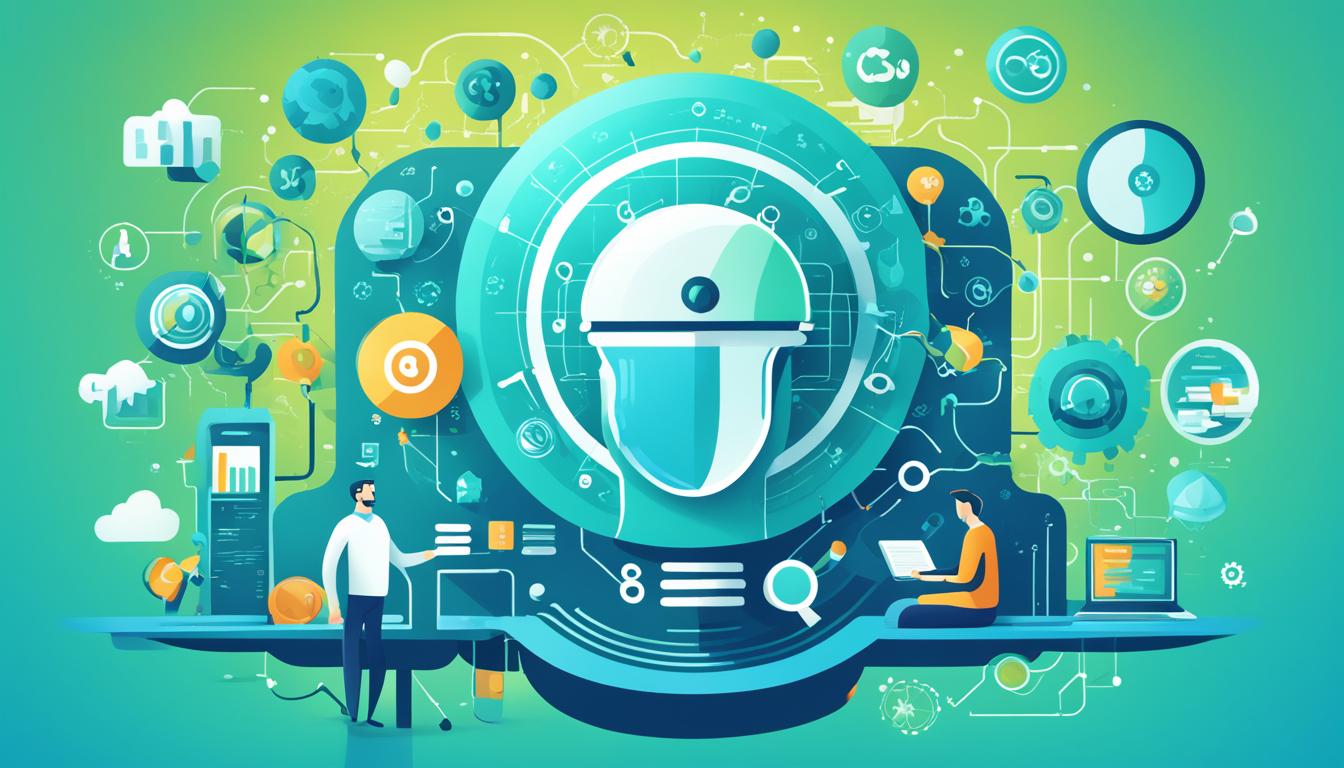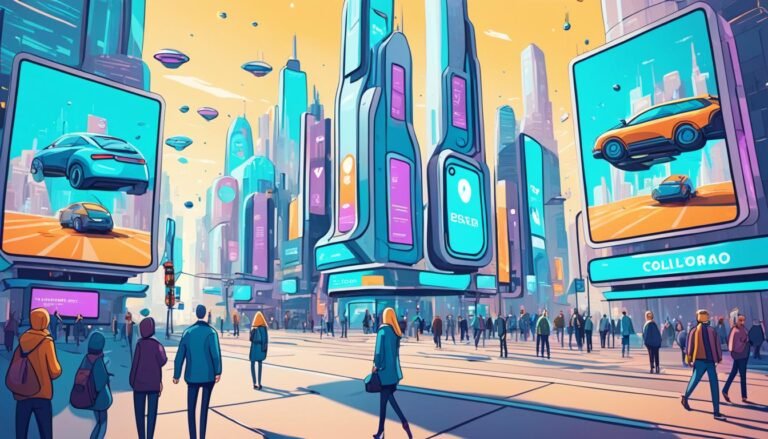AI and SEO: Optimizing for the Future of Search
Artificial Intelligence (AI) has changed many fields, including search engine optimization (SEO). It’s making searches more focused and effective. The use of AI in SEO is changing how we search online.
So, how does AI affect SEO? How should websites prepare for this AI future? Finding the right mix of human skill and AI help is key. Let’s explore the impact of AI on SEO.
Key Takeaways:
- AI-powered algorithms improve search results and customize them for individuals.
- Generative AI tools forever changed how we make and improve content for SEO.
- Finding a good mix of human knowledge and AI automation is vital for SEO to work well.
- For SEO to work in the AI age, we must use AI tools and put a focus on what users want and personalizing their experience.
- AI tools can make SEO tasks easier and lead to better rankings in search engines.
Understanding AI’s Role in Shaping SEO
Algorithms like Google’s RankBrain have changed SEO significantly. They make search results more accurate and personal using AI and machine learning. Now, these algorithms understand what users are looking for.
AI is great at understanding how words are used. This helps search engines give you what you really need. It makes search results more tailored to you.
AI is essential for the future of SEO. It helps search engines understand what you’re really looking for. This way, search results match your needs better. This focus makes searching online more helpful for everyone.
“AI-powered algorithms make search results more accurate and personal. They help find what’s really relevant to you.”
AI gives SEO experts insights into what people want, improving their strategies. By using AI, businesses can connect with users better. This leads to better search rankings and more visitors.
In the AI-driven search era, businesses must use AI in their SEO. It helps them stay competitive and keep improving for the future. AI helps SEO experts keep their strategies up-to-date.
The Impact of AI on Search Algorithms
AI has changed how search algorithms work. Enhanced algorithms like RankBrain make search results more precise. They understand content better, making searches more relevant to users.
Before AI, algorithms matched keywords to find relevant pages. Now, they look at much more. They understand user intent, context and the actual meaning of words.
AI algorithms learn from data and behavior to get what users really want. They show results that meet these needs. This helps users find what they need faster. It also helps businesses connect with the right people more effectively.
The Importance of Relevant Search Results
Search engines want to give you the best information for your search. AI has helped them do this better by considering your context. This might include where you are, what you’ve searched before, and your browsing habits. With AI, search results are more tailored to you.
This changes how businesses should do SEO. Now, it’s about more than just keywords. It’s about creating an experience that’s personal and helpful. Using AI, businesses can make sure their content matches what their audience needs.
Enhancing Content Creation and Optimization with AI
Making good content is key for SEO. Generative AI has changed how we create content. Now, we can make content that’s both fast and accurate, saving time for SEO experts.
AI can create content that matches keywords well. It looks at search patterns and what users want. This helps bring more people to websites and makes them rank higher on search engines.
Having a mix of AI and human skills is important. AI is great for processing data, but human creativity and emotion add something special. It helps content connect with people in a unique way.
By using AI, SEO pros can make better content faster. AI tools help with ideas, organizing content, and coming up with catchy titles. Mixing AI with human know-how makes content that both people and search engines love.
Benefits of Content Optimization with AI
Optimizing content for SEO is very important. AI-powered tools have made content optimization better in several ways:
- AI analyzes data to find the best keywords and phrases, making content more relevant.
- It helps make websites more user-friendly, improving how people interact with them.
- AI keeps an eye on SEO metrics and provides insights to make content better over time.
In the end, AI boosts SEO by helping create better content. Combined with human skills, AI lets SEO experts make content that stands out. This brings in more visitors and broadens the audience.
“AI has really changed how we do SEO. With AI’s help, content can meet users’ needs better, driving up search rankings and organic traffic.”
The Role of AI in Content Creation and Optimization
AI has made content creation and optimization better by automating tasks and giving insights from data. It helps with writing blog posts and articles that are interesting and useful. AI looks at what people search for and what they like to suggest the best content.
AI also makes content better by adding the right keywords, making sure it looks good, and is easy to read. It learns from how search engines work to keep content good at SEO. So, it plays a big role in helping websites do well in searches.
In short, using AI and human skills together is best for great SEO. AI does the data work, but human creativity makes the content stand out. Together, they meet users’ needs well, making SEO and search rankings better.
AI and SEO Performance Benefits
| SEO Performance Benefits | AI-Driven Tools |
|---|---|
| Improved Relevance | In-depth analysis of user intent and search patterns for targeted content creation. |
| Enhanced User Experience | Seamless optimization for a user-friendly website experience. |
| Continuous Improvement | Data-driven insights and performance monitoring for ongoing optimization. |
Balancing Human Expertise and AI in SEO
In the world of SEO, AI is a big player. It automates tasks and gives us insights from data. AI makes it easier to optimize websites and climb search rankings. Yet, we must not forget the importance of human creativity, especially in creating content.
Creating content needs a human touch. AI can write quickly, but it misses what makes content unique: emotions and creativity. Content made by people connects better with users. It makes them trust and engage with what they see.
“By balancing AI tools with human skills, SEO can become more efficient. People can craft content with a unique touch, alongside AI support.”
Using AI tools is key for better SEO. They help with stuff like finding the right keywords, tweaking content for search engines, and checking how well your pages do. This frees up time for SEO experts to focus on making content that really speaks to people.
The key is balance. AI is great for speeding up work and finding insights. But remember, it can’t replace the unique thinking and creativity of humans. It’s all about mixing AI tools with human creativity in creating content.
One important part where humans stand out is understanding what users really want. While AI can study numbers, it can’t get what people mean or feel. Humans are needed to make content that truly answers people’s needs and wishes.
SEO that works best uses both AI support and human creativity. By combining AI’s power with the human element, SEO experts develop content that really speaks to and convinces people.
So, achieving the right mix of AI and human creativity in SEO is vital. Making the most of AI for efficiency, yet keeping content personal, creates strategies that put users first. This builds trust and brings results that matter.
Use AI for its strengths in automation and insights. But always remember, the special touch people add to content is what truly connects with others.
Adapting SEO Strategies for the AI Era
The digital world keeps changing. To beat the competition, we must update how we do SEO for the AI age. Marketers and SEO pros need to use AI to boost their efforts in optimizing for search engines.
Using AI tools is a big part of this change. They can do SEO tasks like finding keywords, making content better, and keeping track of how well you’re doing. With AI, you save time and learn how to do better with insights. This way, you can improve your search results and make users happier.
AI and SEO should focus on what the user wants. AI figures out what people are looking for online. By focusing on the user’s real needs, you can make content that really connects with your audience.
Keeping your content fresh with insights from AI tools is key. These tools tell you what’s working and what’s not. By listening to this feedback and making changes, your content gets better. This keeps your audience happy and coming back for more.
When adapting SEO strategies for the AI era, focus on making content personal. AI gives you data, but the human touch makes your content unique and authentic.
Using AI tools helps you make content that’s just right for your audience. By listening to what AI tells you about your users, you can make content that speaks directly to them. This way, you make their experience better, which can improve your search results and bring more people to your site.
Adapting to the AI era means making your SEO strategies fit the way search engines change. Using AI tools, focusing on what users need, and creating personal content are steps to succeed in SEO.
To wrap it up, improving your SEO for the AI age is key to staying ahead. With AI tools, you can better meet your audience’s needs and understand them. This leads to better search results. AI and SEO together bring exciting chances to grow and connect with your audience like never before.
Embracing AI-Driven Tools for SEO
Today, it’s important to use AI tools for better SEO. These tools can handle various SEO tasks. They make your site more visible on search engines. Let’s look at how AI tools help improve your SEO.
Automating Site Audits for Better Optimization
AI tools can do detailed site audits. They find and fix technical issues that might hurt your site’s SEO. With AI, you quickly see what needs improving.
Uncovering Relevant Keywords for Optimal Content Strategy
AI tools are great at finding the right keywords. They look at what users want and how they search. Using these keywords helps your content rank better and bring in more visitors.
Analyzing Backlinks and Monitoring Performance Metrics
Backlinks are key, and AI makes managing them easier. AI tools find good backlink chances and track their impact. They also show you how your SEO is doing, helping you make smart choices.
Embracing AI-driven tools in SEO streamlines processes, improves search engine rankings, and empowers website owners to make informed decisions.
By using AI for site audits, keyword research, and managing backlinks, you improve your SEO. This helps you stay ahead and win in the online search game.
| AI-Driven SEO Tools | Features |
|---|---|
| Site Audit Tools | Automated website analysis, technical issue identification |
| Keyword Research Tools | Insightful keyword suggestions, search volume analysis |
| Content Optimization Tools | Content analysis, suggestions for improvement |
| Backlink Analysis Tools | Backlink monitoring, competitor analysis |
| Performance Metrics Tools | Real-time SEO performance tracking, data visualization |
AI tools are now a must for SEO success. They help you improve your site, content, and search rankings. By using AI, you move past your competitors and do better online.
Focusing on User Intent and Personalization
In the AI age, SEO has to think about what users want and making it personal. We look at what people need and like, using keywords and understanding their path. This way, the content meets their needs and values. It doesn’t just boost search results but also brings more people to the site.
Looking at keywords is essential to know what users look for. Special tools using AI help us find what people often search for. This lets us add the right words in our content. So, our site shows up when people look for info on what we offer.
It’s more than just keywords, though. It’s about making content that really speaks to our users. We need to completely get what they struggle with and dream about. This way, our content really connects with them.
“Personalized content tailored to specific requirements and preferences leads to improved search rankings and increased website traffic.”
Understanding how users move through our site is crucial too. Knowing their journey helps us offer information that fits every step. This helps us give them the right info and move them towards doing what we want.
Listening to users and keeping up with AI helps us make our SEO strategies better. We always watch how users act, look closely at what they like, and learn from AI tools. This helps us keep making our SEO strategy stronger.
By focusing on what users really want and making it personal, we make them happy and impress search engines. Using AI well lets us make a great SEO plan that works over the long run.
| Benefits of Focusing on User Intent and Personalization | Examples |
|---|---|
| Improved search rankings | Higher visibility on search engine result pages (SERPs) |
| Increased website traffic | More visitors and potential customers |
| Better user experience | Enhanced engagement and lower bounce rates |
| Higher conversion rates | Increased sales and revenue |
Embracing AI for Advanced Content Strategies
AI tools have the power to change how we approach SEO. They can help us understand trends and use advanced analytics. This knowledge improves content and makes it rank better in searches.
AI is great at spotting rising trends by looking at lots of data. This helps content creators make things people really care about. It keeps businesses at the top by predicting what will be important next.
AI also makes content better by looking at keywords, readability, and what users like. It finds where content can do better. Then, it helps make smart choices to improve that content.
Looking at how content is doing is key. AI gives us info to see if our content is working well. It looks at things like page views and click rates. This helps us keep making our content better over time.
Using AI helps us always get better at reaching people online. It focuses on finding the right trends, making content better, and tracking what works. This way, businesses can do better in search engines and get more visitors.
As AI gets better, it gives businesses a leg up online. With AI, businesses can be up to date and offer what their audience really wants. They’ll have content that’s well-made and draws people in.
By using AI in content strategies, businesses can make their SEO game strong. AI helps keep content fresh and interesting. It knows what users want, bringing more people in and increasing success.
| AI Tools for Advanced Content Strategies | Benefits |
|---|---|
| Trend Identification | – Early adoption of emerging trends – Relevant and engaging content |
| Content Optimization | – Improved keyword relevance – Enhanced readability – Increased user engagement |
| Performance Metrics Analysis | – Tracking key performance indicators – Data-driven decision-making – Continuous content refinement |
The Balance Between Man and Machine: The Future Trend
The mix of AI optimization and human expertise is key in SEO. AI can create initial drafts, but it’s human writers who add personal touch. They include client insights, personal experiences, and a unique style. This mix empowers writers to make AI content more human, increasing trust and engagement.
Writers follow the C.R.A.F.T framework to make content compelling. It’s about being Consistent, Relevant, Accurate, Factual, and Targeted. This approach helps them use AI’s abilities while keeping their own creative touch.
“AI-generated content with human expertise creates stories that grab people’s interest and improve SEO.”
Every AI’s strength is accuracy and efficiency, while humans bring creativity and emotions. When these two work together, SEO excels. They create stories that connect with people, build trust, and increase engagement.
Benefits of the C.R.A.F.T Framework
The C.R.A.F.T framework has many benefits in the AI era:
- It ensures a strong online presence by keeping messaging and voice consistent.
- It delivers personalized content that matches user intentions through AI and human insights.
- Human experts validate content, adding a human element that enhances trust.
- It combines AI and human checks to make sure content is accurate and reliable.
- By analyzing user behavior, AI tailors content for specific groups, making it more effective.
Using the C.R.A.F.T framework, writers can find the right mix of AI and human skills. This blend boosts SEO to create better content, improve user experiences, and increase organic traffic.
Unlocking the Future Potential
As AI grows, so do SEO’s capabilities. The next big thing is combining AI and human skills to better content creation. By using AI’s insights and automation wisely, with human creativity, SEO experts can excel.
In short, AI and human cooperation are crucial in SEO’s future. Through the C.R.A.F.T framework, writers ensure content is accurate and engaging. By blending AI’s power with creativity, SEO experts can lead in the AI-focused future of search.
Conclusion
AI changes how we think about SEO, bringing both more efficient and user-friendly methods to the table. When we use tools driven by AI and mix them with what people know, we get great results. The world of SEO is evolving fast, thanks to these AI breakthroughs.
In the upcoming years, SEO will stay very important in digital marketing. To do well in the time of AI, keeping up with the newest AI tech is key. It’s all about adjusting your plans and keeping your website friendly to the changing search systems.
Thanks to AI-powered SEO, companies can automate some tasks and better understand what users want. This leads to content that really speaks to people. Byjoining AI’s power with human creativity, we can make stories that people love, helping us rank better on search engines.
As AI gets better, so should our SEO strategies. Marketers and SEO experts need to keep learning, use AI tools well, and come up with new ideas. This way, they can keep winning in the SEO future full of AI.







